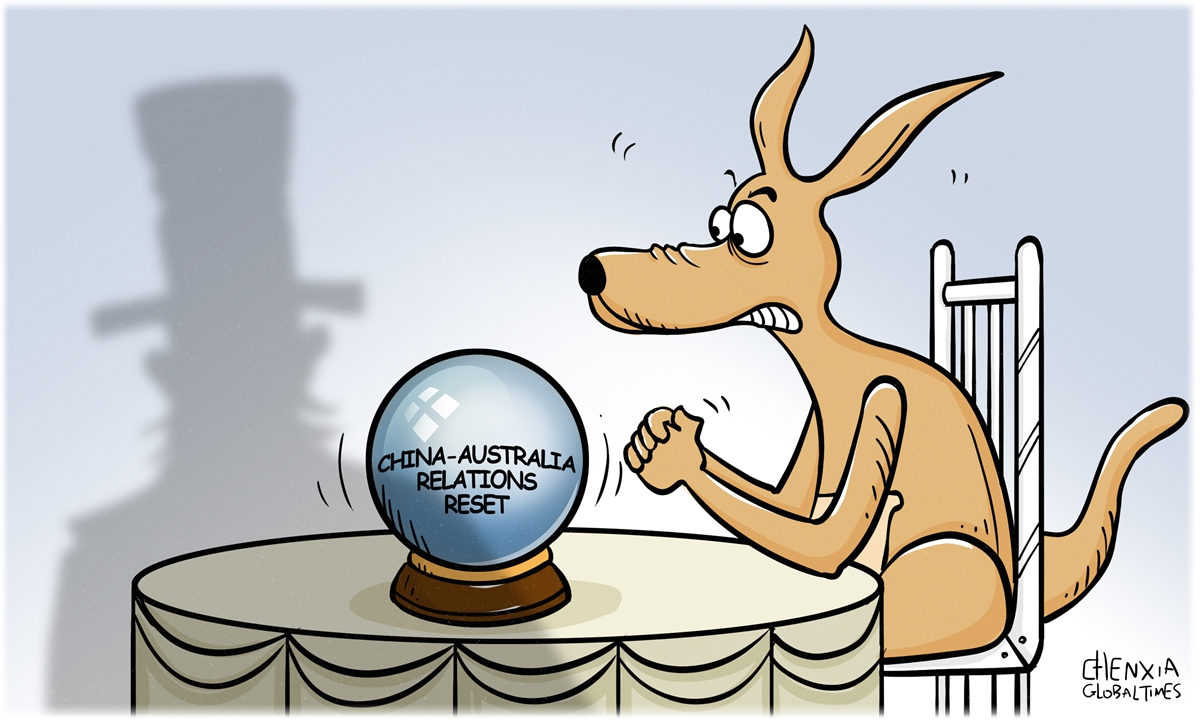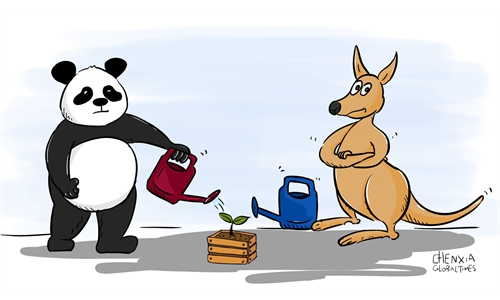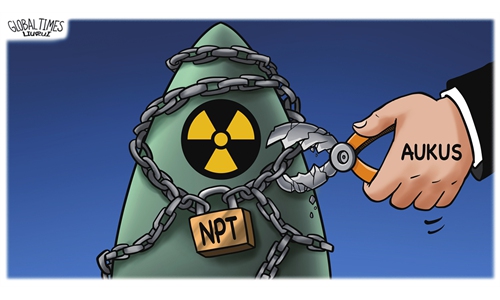
Illustration: Chen Xia/GT
The sharp deterioration in China-Australia relations since 2015 has not only led to a regression in cooperation in advancing global governance, addressing challenges such as climate change, promoting regional economic integration, and maintaining regional peace and stability, but has also shaken the hard-won foundation of mutual trust between the two countries, and has seriously undermined mutually beneficial economic and trade cooperation and the well-being of the two peoples.Under the circumstances that the economy across the globe, especially in Western countries, faces severe recession, and that the commodity prices in many countries including Australia are skyrocketing, the new Australian government has expressed its willingness to improve ties with China. Prime Minister Anthony Albanese, ahead of the recent APEC Economic Leaders' Meeting, reaffirmed support for the "one China" policy. This can be seen as one of the moves aimed at bringing China-Australia relations closer.
Given Australia's maneuvers against China in the past, especially since the COVID-19 pandemic broke out, the Chinese people have less trust toward Canberra's sincerity to improve bilateral ties. They worry that the moves are only makeshift ones by the Australian government and politicians amid the West's and Australia's economic downturn. They even worry that constant malice from Australian politicians would bring a dead end to bilateral ties, making it difficult to reset the relations. Despite doubts about Canberra's sincerity, the Chinese public still welcomed Australia's moves cautiously.
There are no historical issues or conflicting core interests between the two countries. Instead, the two have similar demands and thinking in major issues such as economic development and global governance. The relationship flourished in the early years of the new century under the dedicated care of visionary political leaders and people on both sides. In 2014, the two countries upgraded their relationship to comprehensive strategic partnership. The China-Australia Free Trade Agreement was successfully concluded with the joint efforts of the two sides. The excellent strategic and political relationship has laid the foundation for peace, stability, and prosperity in the Asia-Pacific region and the rapid development of mutually beneficial economic and trade cooperation between the two countries. China has been Australia's largest trading partner since 2009. China is Australia's top export destination, with exports to China accounting for 38.8 percent of Australia's total exports of goods in 2021.
Former Singapore prime minister Lee Kuan Yew once warned that Australia risked becoming "the poor white trash of Asia." According to him, Australia was resource rich, making it a relaxed society, with high consumption, low savings, low competitiveness, high current account deficits and high debt. China's rapid economic development has helped Australia avoid becoming "the poor white trash of Asia" and retain its economic prosperity for the past few decades. No wonder successive prime ministers of Australia since the end of the Cold War to 2015 cherished the healthy development of China-Australia relations.
Regrettably, since the end of 2015, Australian leaders have deviated from their original intentions and insisted on following the US to contain China. As a result, the bilateral relationship has deteriorated sharply, resulting in a steep decline in mutually beneficial economic and trade cooperation. The previous governments have repeatedly blocked Chinese investment with the excuse of national security. Chinese firms laid out $778 million in Australia in 2021, compared to $2.5 billion in 2020. Canberra also followed the West in banning Huawei from 5G network construction and even absurdly accused Chinese students of being "spies," causing the number of Chinese students going to Australia to plummet to an all-time low. The malicious actions of the Australian government and certain politicians that harmed bilateral relations have not only caused huge loss to Chinese enterprises and people but also contributed to the plummeting per capita GDP of Australia in recent years.
The existence of different views and even disputes between countries is a normal phenomenon in international relations and should not be used as an excuse to affect mutually beneficial cooperation, let alone as a tool for certain politicians to seek their own interests to the detriment of the well-being of the vast majority of the people. The fundamental factor in the ups and downs of China-Australia relations in the post-Cold War period does not lie in the "superficial disputes" between the two countries but in whether Australia is sincere in maintaining the stable development of mutually beneficial cooperative relations.
Makeshift moves that lack sincerity may bring short-term interests, but it will seriously damage the hard-won trust between the two countries, especially between the two peoples, and cost the future development of relations between the two countries dearly. Chinese people sincerely hope that Australia's willingness to improve China-Australia relations this time is sincere, and they hope that the Australian government will take history as a mirror and cherish the hard-won equality and mutually beneficial cooperation so as to benefit the two peoples.
The author is a chief research fellow and professor at the Research Center for Pacific Island Countries of Liaocheng University. opinion@globaltimes.com.cn


